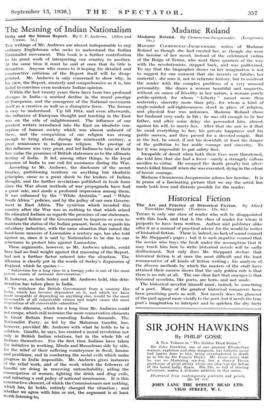Madame Roland
MADAME CLEMENCEAII.JACQUEMAI RE writes of Madame Roland as though she had created her, as though she were the heroine of her novel, instead of the celebrated victim of the Reign of Terror, who went three quarters of the way with the revolutionists, stepped back, and was guillotined. To say that the biographer draws on her imagination is not to suggest for one moment that she invents or falsifies her material ; she uses it, not to reiterate history, but to confront the reader with the complex problems of a very unusual personality. She draws a woman beautiful and magnetic, without an ounce of frivolity in her nature, a woman purely public-spirited, for whom " Liberty " meant more than maternity, sincerity more than pity, for whom a kind of single-minded self-righteousness stood in place of religion, and physical fear was unknown. Madame Roland chose her husband very early in life ; he was old enough to be her father, and after some delay she persuaded him, almost against his will, to marry her. After that she saw to it that he owed everything to her, his private happiness and his public success, and they passed for a devoted couple. But at the last, he owed, if not his downfall. at least his danger of the guillotine to her noble courage and sincerity. To her it was impossible to put safety first.
Incapable of deceit when both their lives were threatened, she told him that she had a lover—surely a strangely callous sacrifice to virtue. He escaped the death penalty but after- wards 'killed himself when she was executed, dying in the odour of heroic courage.
Madame Clemenceau-Jacquemaire adores her heroine: It is in praise of a fascinating picture that we say the artist has made both love and distaste possible for the reader.










































 Previous page
Previous page